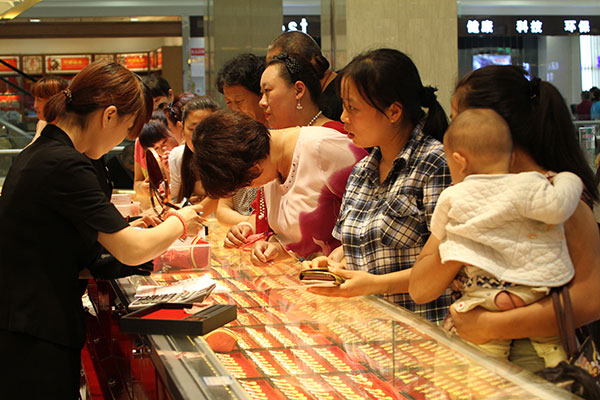A golden chance to check global financial health
Updated: 2015-08-01 09:35
By Zhu Qiwen(China Daily)
|
||||||||
 |
|
Customers buy gold jewelry at a shopping center in Xuchang, Henan province. [Photo/China Daily] |
The recent plunge in gold prices is a reminder of how little we know about the impact that ultra-low interest rates can have on the global financial system. If the world economy, bitterly shaken by the 2008 global financial crisis, is to avoid another crisis, policymakers across the world better open their eyes to the potential dangers of keeping interest rates too low for too long.
Just when the international community breathed a sigh of relief over European Union leaders striking a deal on Greece and Chinese policymakers arresting the sharp fall of the domestic stock market, gold prices suddenly plunged to a five-year-low on July 20, casting a cloud of uncertainty over global growth prospects.
The decline in gold prices began soon after it reached a record peak of almost $2,000 an ounce in September 2011. Yet had it not been for the dramatic sell-off within a matter of minutes on July 20, few would have noticed that gold had already shed half the gains from its 12-year high in 2011. It was reported that more than 33 tons of gold, worth about $1.3 billion, were traded in 2 minutes in Shanghai, although the exact reason for such aggressive selling remains unclear.
Some investors expect gold prices to drop to $1,000 an ounce or even lower by end of the year, while others believe the sell-off across resources has gone too far, and prices are likely to rebound toward the year-end.
It is far too early to say if the latest slide marks the beginning of another dramatic retreat, similar to the one in the second quarter of 2013, when prices fell nearly $200 an ounce in just two days in April, and another 11 percent in June.
Chinese investors who had rushed to buy gold then might have good reason to be once bitten, twice shy. But that doesn't mean policymakers around the world can afford to turn a blind eye to the possible causes and consequences of increased volatility in gold prices.
Typically, as a haven from global turmoil, gold plays the long-term role of a steady store of value or an appreciating asset. That is why many investors bought gold as a hedge against global economic turbulence in the wake of the 2008 global financial crisis.
With gold prices going down, can global leaders expect less financial turmoil now?
It is true that the fall in gold prices is generally in line with the trend of most commodities becoming cheaper in recent years. While the developed world has barely rebounded from the 2008 financial crisis, growth in emerging economies is slowing and thus reducing demand. And a recent World Bank report says gold prices could fall 12 percent this year.
But it is also true that the drop in gold prices has a lot to do with expectations that the US Federal Reserve will raise short-term rates this year for the first time since 2006. Theoretically, a rise in rates would make it less attractive to hold non-yielding bullion.
Nevertheless, falling gold prices should not justify confidence in the strength of the US dollar and economy by default. In other words, it is too dangerous for policymakers across the world to buy the view that the dollar, still as a safe haven, has re-emerged at the expense of gold.
The fact that talks about an inevitable US interest rate hike have already triggered volatile fluctuations in foreign exchange rates to wreak havoc in emerging economies should give rise to doubts over the optimism that accommodative monetary policies in developed countries can be good for them as well as others.
As gold prices fall at a time when the world economy is set to grow at the slowest pace since the 2008 financial crisis, the right question policymakers should ask themselves is: Does someone know something that the rest of us don't about the global financial health?
The author is a senior writer with China Daily. zhuqiwen@chinadaily.com.cn
- Global health entering new era: WHO chief
- Brazil's planning minister steps aside after recordings revelation
- Vietnam, US adopt joint statement on advancing comprehensive partnership
- European border closures 'inhumane': UN refugee agency
- Japan's foreign minister calls A-bombings extremely regrettable
- Fukushima impact unprecedented for oceans: US expert

 Stars of Lijiang River: Elderly brothers with white beards
Stars of Lijiang River: Elderly brothers with white beards
 Wealthy Chinese children paying money to learn British manners
Wealthy Chinese children paying money to learn British manners
 Military-style wedding: Fighter jets, grooms in dashing uniforms
Military-style wedding: Fighter jets, grooms in dashing uniforms
 Striking photos around the world: May 16 - May 22
Striking photos around the world: May 16 - May 22
 Robots help elderly in nursing home in east China
Robots help elderly in nursing home in east China
 Hanging in the air: Chongqing holds rescue drill
Hanging in the air: Chongqing holds rescue drill
 2.1-ton tofu finishes in two hours in central China
2.1-ton tofu finishes in two hours in central China
 Six things you may not know about Grain Buds
Six things you may not know about Grain Buds
Most Viewed
Editor's Picks

|

|

|

|

|

|
Today's Top News
Liang avoids jail in shooting death
China's finance minister addresses ratings downgrade
Duke alumni visit Chinese Embassy
Marriott unlikely to top Anbang offer for Starwood: Observers
Chinese biopharma debuts on Nasdaq
What ends Jeb Bush's White House hopes
Investigation for Nicolas's campaign
Will US-ASEAN meeting be good for region?
US Weekly

|

|







